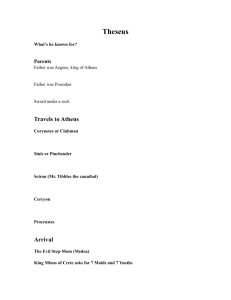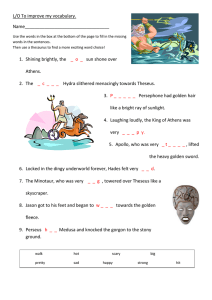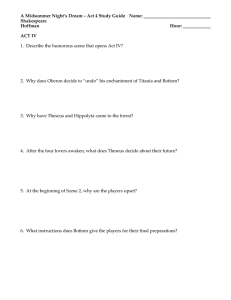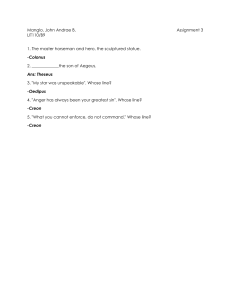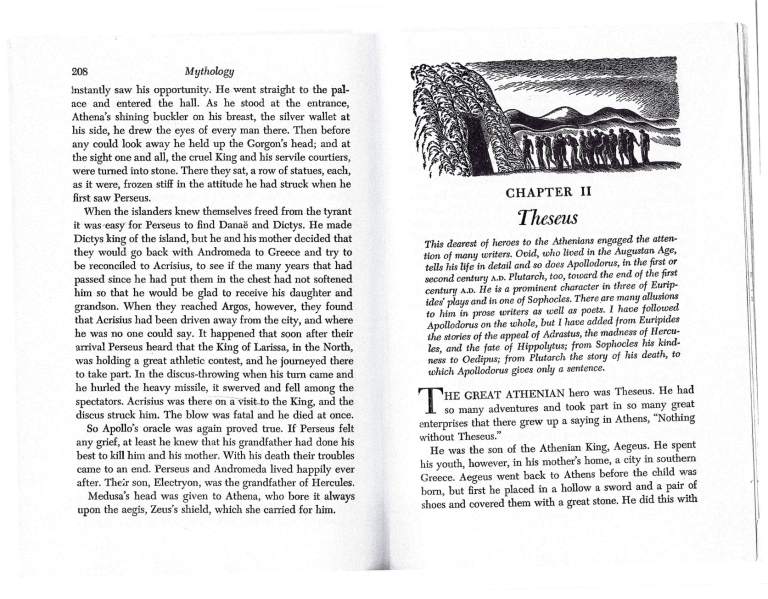
'1 I\!I, 208 Mythology lnstantlysaw his opportunity. He went straight to the palace and entered the hall. As he stood at the entrance, Athena's shining buckler on his breast, the silver wallet at his side, he drew the eyes of every man there. Then before any could look away he held up the Gorgon's head; and at the sight one and all, the cruel King and his servile courtiers, were turned into stone. There they sat, a row of statues, each, as it were, frozen stiff in the attitude he had struck when he first saw Perseus. When the islanders knew themselves freed from the tyrant it was-easyfot Perseus to find Danae and Dictys. He made Dictys king of the island, but he and his mother decided that they would go back with Andromeda to Greece and try to be reconciled to Acrisius, to see if the many years that had passed since he had put them in the chest had not softened him so that he would be glad to receive his daughter and grandson. When they reached Argos, however, they found that Acrisius had been driven away from the city, and where he was no one could say. It happened that soon after their arrival Perseus heard that the King of Larissa, in the North, was holding a great athletic contest, and he' journeyed there to take palt. In the discus-throwing when his turn came and he hurled the heavy missile, it swerved and fell among the spectators. Acrisius was there ona visit.to the King, and the discus struck him. The blow was fatal and he died at once. So Apollo's oracle was again proved true. If Perseus felt any grief, at least he knew that his grandfather had done his best to kill him and his mother. With his death their troubles came to an end. Perseus and Andromeda lived happily ever after. Their son, Electryon, was the grandfather of Hercules. Medusa's head was given to Athena, who bore it always upon the aegis, Zeus's shield, which she carried-for him. 1\' CHAPTER II ! Theseus This dearest of heroes to the Athenians engaged the attention of many writers. Ovid, who lived in the Augustan Age, tells his life in detail and so does Apollodorus, in the first or second century A.D. Plutarch, too, toward the end of the fi·rst century A.D. He is a prominent character in three of Euripides' plays and in one of Sophocles. There are many allusions to him in ptose writers as well as poets. I have followed Apollodortts on the whole, but I have added from Euripides the stories of the appeal of Adrastus, the madness of Hercules, and the fate of Hippolyltts; frm11 Sophocles his kindness to Oedipus; from Plutarch the story of his death, to which Apollodorus gives only a sentence. T HE GREAT ATHENIAN hero was Theseus. He had so many adventures and took part in so many great enterprises that there grew up a saying in Athens, "Nothing without Theseus." He was the son of the Athenian King, Aegeus. He spent his youth, however, in his mother's home, a city in southern Greece. Aegeus went back to Athens before the child was born, but first he placed in a hollow a sword and a pair' of shoes and covered them with a great stone. He did this with I i .-II \ 210· 1 . Mythology Theseus the kriowledge of his. wife and told her that whenev(:'x !.!Ie boy ---:-ifit was a boi~ grew strong enough to roll away the stone and get the things beneath it, she could send him to Athens to claim him as his father. The child was a boy and he grew up strong far beyond others, so that when his mother :6nally took him to the stone he lifted it with no trouble at all. She told him then that the time had come for him to seek his father, and a ship was placed at his dir posal by his grandfather. But Theseus refused to go by VI ater, because the voyage was safe and easy. His idea was to become a great hero as quickly as possible, and easy safety was certainly not the way to do that. Hercules, who was the most magni:6cent of all the heroes of Greece, was always in his mind, and the determination to be just as magnificent himself. This was quite natural since the two were cousins. He steadfastly refused, therefore, the ship his mother and grandfather urged on him, telling them that to sail on it would be a contemptible flight from danger, and he set forth to go to Athens by land. The joumey was long and very hazardous because of the bandits that beset the road. He killed them all, however; he left not one alive to trouble future travelers. 'His idea of dealing justice was simple, but effective: what each had done to others, Theseus did to him. Sciron, for instance, who had made those he captured kneel to wash his feet and then kicked them down into the sea, Theseus hurled over a precipice. Sinis, who killed people by fastening them to two pine trees bent down to the ground and letting the trees go, died in that way himself. Procrustes was placed upon the iron bed which he used for his victims, tying them to it and then making them the right length for it by stretching those who were too short and cutting off as much <) • See next chapter. 211 as was necessary from those who were too long. The story does not say which of the two methods was used in his case, but there was not much to choose between them and in one way or the other Procrustes' career ended. It can be imagined how Greece rang with the praises of the young man who had cleared the land of these banes to travelers. When he reached Athens he was an acknowledged hero and he was invited to a banquet by the King, who of course was unaware that Theseus was his son. In fact he was afraid of the young man's great popularity, thinking that he might win the people over to make him king, and he invited him with the idea of poisoning him. The plan was not his, but Medea's, the heroine of the Quest of the Golden Fleece who knew through her sorcery who Theseus was. She had fled to Athens when she left Corinth in her winged car, and she had acquired great influence over Aegeus, which she did not want disturbed by the appearance of a son. But as she handed him the poisoned cup Theseus, wishing to make himself known at once to his father, drew his sword. The King instantly recognized it and dashed the cup to the ground. Medea escaped as she always did and got safely away to Asia. Aegeus then proclaimed to the country that Theseus was his son and heir. The new heir apparent soon had an opportunity to endear himself to the Athenians. Years before his arrival in Athens, a terrible misfortune had happened to the city. Minos, the powerful ruler of Crete, had lost his only son, Androgeus, while the young man was visiting the Athenian King. King Aegeus had done what no host should do, he had sent his guest on an expedition full of peril - to kill a dangerous bull. Instead, the bull had killed the youth. Minos invaded the country. captured Athens and \\l ill' il. 212 Mythology declared that he would raze it to the ground unless every nine years the people sent him a tribute of seven maidens and seven youths. A horrible fate awaited these young creatures. When they reached Crete they were given to the Minotaur to devour. The Minotaur was a monster, half bull, half human, the offspring of Minos' wife Pasiphae and a wonderfully beautiful bull. Poseidon had given this bull to Minos i.n order that he should sacrifice it to him, but Minos could not bear to slay it and had kept it for himself. To punish him, Poseidon had made Pasiphae fall madly in love with it. When the Minotaur was born Minos did not kill him, He had Daedalus, a great architect and inventor, construct a place of confinement for him from which escape was impossible. Daedalus built the Labyrinth, famous throughout the world. Once inside, one would go endlessly along its twisting paths without ever finding the exit. To this place the young Athenians were each time taken and left to the Minotaur. There was no possible way to escape. In whatever direction they ran they might be running straight to the monster; if they stood still he might at any moment emerge from the maze. Such was the doom which awaited fourteen youths and maidens a few days after Theseus reached Athens. The time had come for the next installment of the tribute. At once Theseus came forward and offered to be one of the victims. All loved him for his goodness and admired him for his nobility, but they had no idea that he intended to try to kill the Minotaur. He told his father, however, and promised him that if he succeeded, he would have the black sail which the ship with its cargo of misery always carried changed to a white one, so that Aegeus could know long before it came to land that his SOD. was safe. 111\ I, Theseus 215 When the young victims arrived in Crete they were pa~ raded before the inhabitants on their way to the Labyrinth. Minos' daughter Ariadne was among the spectators and she fell in love with Theseus at first sight as he marched past her. She sent for Daedalus and told him he must show her a way to get out of the Labyrinth, and she sent for Theseus and told him she would bring about his escape if he would promise to take her back to Athens and marry her. As may be imagined, he made no difficulty about that, and she gave him the clue she had got from Daedalus, a ball of thread which he was to fasten at one end to the inside of the door and unwind as he went on. This he did and, certain that he could retrace his steps whenever he chose, he walked boldly into the maze looking for the Minotaur. He came upon him asleep and fell upon him, pinning him to the ground; and with his fists - he had no other weapon - he battered the monster to death. As an oak tree falls on the hillside Crnshing all that lies beneath, So Theseus. He presses out the life, The brute's savage life, and now it lies dead. Only the head sways slowly, but the horns are useless now -. When Theseus lifted himself up from that terrific struggle, the ball of thread lay where he had dropped it. With it in his hands, the way out was clear. The others followed and taking Ariadne with them they fled to the ship and over the sea toward Athens. On the way there they put in at the island of Naxos and what happened then is differently reported. One story says that Theseus deserted Ariadne. She was asleep and he sailed away without her, but Dionysus found her and comforted her. The other storv is much more favorable to The- ,j 1- i t Mythology 216 seus. She was extremely seasick, and he set her ashore to recover while he returned to the ship to do some necessary work. A violent wind carried him out to sea and kept him there' a long time. On his return he found that Ariadne had died, and he was deeply afHicted. Both stories agree that when they drew near to Athens he forgot to hoist the white sail. Either his joy at the success of bis voyage put every other thought out of his head, or his grief for Ariadne. The black sail was seen by his father, King Aegeus, from the Acropolis, where for days he had watched the sea with straining eyes. It was to him the sign of his son's death and he threw himself down from a rocky height into. the sea, and was killed. The sea into which he fell was called the Aegean ever after. So Theseus became King of Athens, a most wise and disinterested king. He declared to the people that he did not wish to rule over them; he wanted a people's government where all would be equal. He resigned his royal power and organized a commonwealth, building a council hall where the citizens should gather and vote. The only office he kept for himself was that of Commander in Chief. Thus Athens became, of all earth's cities, the happiest and most prosperous, the only true home of liberty, the one place in the world where the people governed themselves. It was for this reason that in the great War of the Seven against Thebes, when the victorious Thebans refused burial to those of the enemy who had died, the vanquished turned to Theseus and Athens for help, believing that free men under such a leader would never consent to having the helpless dead wronged. Theydid not turn in vain. Theseus led his army against Thebes, conquered her and forced her to allow them to be I) II See Part V, Chapter IL \1' t Theseus 217 buried. But when he was victor he did not return evil to the Thebans for the evil they had done. He showed himself the perfect knight. He refused to let his army enter and loot the city. He had come not to harm Thebes, but to bury the Argive dead, and that duty done he led his soldiers back to Athens. In many other stories he shows the same qualities. He received the aged Oedipus whom everyone else had cast out. <I He was with him when he died, sustaining and comforting him. He protected his two helpless daughters and sent them safely home after their father's death. When Hercules GO in his madness killed his wife and children and upon his return to sanity determined to kill himself, Theseus alone stood by him. Hercules' other friends fled, fearing to be polluted by the presence of one who had done so horrible a deed, but Theseus gave him his hand, roused his courage, told him to die would be a coward's act, and took him to Athens. All the cares of state, however, and all the deeds of knighterrantry to defend the wronged and helpless, could not restrain Theseus' love of danger for the sake of danger. He went to the country of the Amazons, the women warriors, some say with Hercules, some say alone, and brought away one of them, whose- name is given sometimes as Antiope, sometimes as Hippolyta. It is certain that the son she bore Theseus was named Hippolytus, and also that after his birth the Amazons came to rescue her and invaded Attica, the country around Athens, even making their way into the city. They were finally defeated and no other enemy entered Attica as long as Theseus lived. But he had manyother adventures. He was one of the men who sailed on the Argo to find the Golden Fleece. He took part in the great Calydonian Hunt, when the King of <I 00 See Part V, Chapter II. See Part 1Il, Chapter Ill. I~ Ir 218 Mythology Calydon called upon the noblest in Greece to help him kill the terrible boar which was laying waste his country. During the hunt Theseus saved the life of his rash friend Pirithoiis, as he did, indeed, a number of times. Pirithotis was quite as adventurous as Theseus, but by no means as successful, so u.at he was perpetually in trouble. Theseus was devoted to him and always helped him out. The friendship between them came about through an especially rash act all Pirithciis' part. It occurred to him that he would like to see for himself if Theseus was as great a hero as he was said to be, and he forthwith went into Attica and stole some of Theseus' cattle. When he heard that Theseus was pursuing him, instead of hurrying away he turned around and went to meet him, with the intention, of course, of deciding then and there which was the better man. But as the two faced each other Pirithoiis, impulsive as always, suddenly forgot everything in his admiration of the other. He held out his hand to him and cried, "I will submit to any penalty you impose. You be the judge." Theseus, delighted at this warm-hearted action, answered, "All I want is for you to be my frie~d and brother-in-arms." And the two took a solemn oath of friendship. When Pirithoiis, who was King of the Lapithae, married, Theseus was, of course, one of the guests, and was exceedingly useful there. The marriage feast was perhaps the most unfortunate that ever took place. The Centaurs, creatures who each had the body of a horse and the chest and face of a man, were related to the bride and came to the wedding. They proceeded to get 'drunk and to seize the women. Theseus leaped to the defense of the bride and struck down the Centaur who was trying to carry her off. A terrible battle followed, but the Lapithae conquered and finally drove the Theseus " / 219 whole race of Centaurs out of the country, Theseus helping them to the end. But in the last adventure the two undertook he could not save his friend. Quite characteristically, Pirithoiis, after the bride of the disastrous wedding feast was dead, decided that for his second wife he would try to get the most carefully guarded lady in all the universe, none other than Persephone herself. Theseus agreed, of course, to help him, but, stimulated probably by the idea of this magnificently dangerous undertaking, declared that first he would himself carry off Helen, the future heroine of Troy, I> then a child, and when she was grown marry her. This, though less hazardous than the rape of Persephone, was perilous enough to satisfy the most ambitious. Helen's brothers were Castor and Pollux, more than a match for any mortal hero, Theseus succeeded in kidnaping the little girl, just how we are not told, but the twc brothers marched against the town she had been taken to, and got her back. Luckily for him they did not find Theseus there. He was on his way to the underworld with Pirithoiis. The details of their journey and arrival there are not known beyond the fact that the Lord of Hades was perfectly aware of their intention and amused himself by frustrating it in a novel way. He did not kill them, of course, as they were already in the realm of death, but he invited them as ~ friendly gesture to sit in his presence. They did so on the seat he pointed them to - and there they stayed. They could not arise from it. It was called the Chair of Forgetfulness. Whoever sat on it forgot everything. His mind became a blank and he did not move. There Pirithoiis sits forever, but The-. seus was freed by his cousin. When Hercules came to the uno See Part IV, Chapters I and II. Mythology .Theseus derworld he lifted Theseus from the seat and brought him back to earth. He tried to do the same for Pirithoiis, but could not. The King of the Dead knew that it was he who had planned to carry off Persephone, and he held him fast. In the later years of his life Theseus married Ariadne's sister Phaedra, and thereby drew down terrible misfortunes on her and on himself and on his son Hippolytus, the son the Amazon had borne him. He had sent Hippo1ytus away while still a young child to be brought up in the southern city where Theseus had spent his own youth. The boy grew to splendid manhood, a great athlete and hunter, despising those who lived in luxurious ease and still more those who were soft enough and silly enough to fall in love. He scorned Aphrodite; he worshiped only Artemis, the huntress chaste and fair. So matters stood when Theseus came to his old home bringing Phaedra with him. A strong affection grew up at once between father and son. They delighted in each other's company. As for Phaedra, her stepson Hippolytus took no notice of her; he never noticed women. But it was far otherwise with her. She fell in love with him, madly and miserably, overwhelmed with shame at such a love, but utterly unable to conquer it. Aphrodite was back of this wretched and ominous state of affairs. She was angry at Hippolytus and determined to punish him to the utmost. Phaedra, in her anguish, desperate, seeing no help for her anywhere, resolved to die and let no one know why. Theseus at the time was away from home, but her old nurse - completely devoted to her and unable to think anything bad that Phaedra wanted - discovered all, her secret passion, her despair, and her determination to kill herself. With only one thought in her mind, to save her mistress. she went straight to Hippolytus. 'She is dying tor love of you," she said. "Give her life. Give her love for love." Hippolytus drew away from her with loathing. The love of any woman would have disgusted him, but this guilty iove sickened and horrified him. He rushed out into the courtyard, she followhig him and beseeching him. Phaedra was sitting there; but he never saw her. He turned in furious indignation on the old woman. "You pitiable wretch," he said, "trying to make me betray my father. I feel polluted by merely hearing such words. Oh, women, vile women - everyone of them vile. I will never enter this house again except when my father is in it." . He flung away and the nurse, turning, faced Phaedra. She had risen and there was a look on her face which frightened the old woman. "111 help you still," she stammered. "Hush," Phaedra said. "1will settle my own affairs." With that she entered the house and the nurse trembling crept after her. A few minutes later the voices of men were heard greeting the master of the house on his return and Theseus entered the courtyard. Weeping women met him there. They told him that Phaedra was dead. She had killed herself. They had just found her, quite dead, but in her hand a letter to her husband. "0 dearest and best," Theseus said. "Are your last desires .written here? This is your seal- yours who will never more smile up at me." He opened and read it and read it again. Then he turned to the servants filling the courtyard. "This letter cries aloud," he said. "The words speak - they have a tongue. Know all of you that my son laid violent hands 220 'to. 221 1 '~ 222 Mythology upon my wife. 0 Poseidon, God, hear me while I curse him, and fulfill my curse." The silence that followed was broken by hurrying footsteps. Hippolytus entered. "What happened?" he cried. "How did she die? Father, tell me yourself. Do not hide your grief from me." "There ought to be a true yardstick to measure affection by," said Theseus, "some means to know who is to be trusted and who is not. You here, look at my son - proved base by the hand of her who is dead. He offered her violence. Her letter outweighs any words he could speak. Go. You are an exile from this land. Go to your ruin and at once." "Father," Hippolytus answered, "I have no skill in speaking and there is no witness to my innocence. The only one is dead. All I can' do is to swear by Zeus above that I never touched your wife, never desired to, never gave her a thought. May I die in wretchedness if I am guilty." "Dead she proves her truth," Theseus said. "Go. You are banished from the land." Hippolytus went, but not into exile; death was waiting close at hand for him too. As he drove along the sea-road away from the home he was leaving forever, his father's curse was fulfilled. A monster came up from the water and his horses, terrified beyond even his film control, ran away. The chariot was shattered and he was mortally hurt. Theseus was not spared. Artemis appeared to him and told him the truth. I do not come to bring you help, but only pain, To show you that your son was honorable. Your wife was guilty, mad with love for him. And yet she fought her passion and she died. But what she wrote was false. Theseus \, 223 As Theseus listened, overwhelmed by this sum of terrible events, Hippolytus still breathing was carried in. He gasped out, "I was innocent. Artemis, you? My goddess, your huntsman is dying." "And no other can take your place, dearest of men to me," she told him. Hippolytus turned his eyes from her radiance to Theseus brokenhearted. "Father, dear Father," he said. "It was not your fault." "If only I could die for you," Theseus cried. The calm sweet voice of the. goddess broke in on their anguish. "Take your son in your arms, Theseus," she said. "It was not you that killed him. It was Aphrodite. Know this, that he will never be forgotten. In song and story men will remember him," She vanished from sight, but Hippolytus, too, was gone. He had started on the road that leads down to the realm of death. Theseus' death, also, was wretched. He was at the court of a friend, King Lycomedes, where a few years later Achilles was to hide disguised as a girl. Some say that Theseus had gone there because Athens had banished him. At all events, the King, his friend and his host, killed him, we are not told why. Even if the Athenians did banish him, very soon after his death they honored him as no other mortal. They built a great tomb for him and decreed that it should be forever a sanctuary for slaves and for all poor and helpless people, in memory of one who through his life had been the protector of the defenseless.

